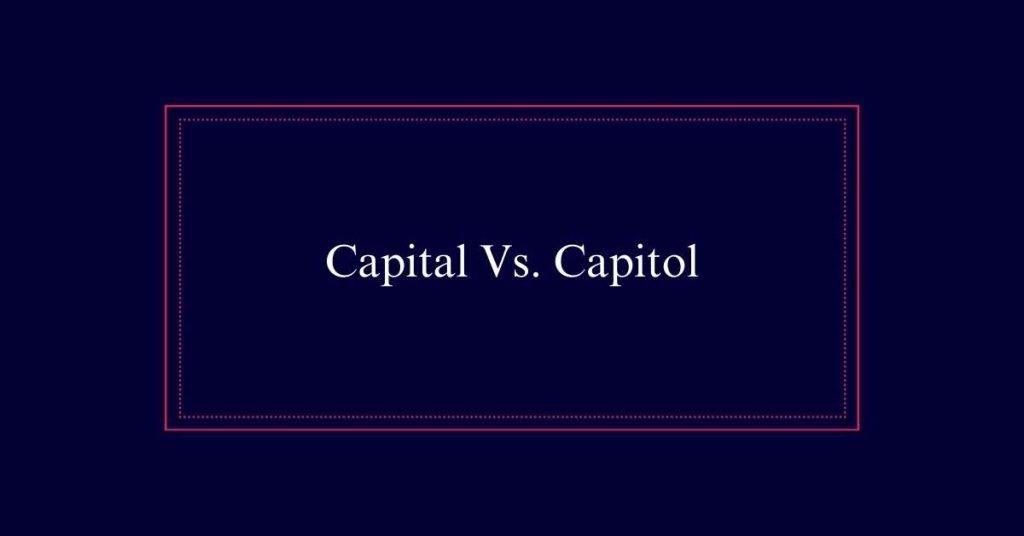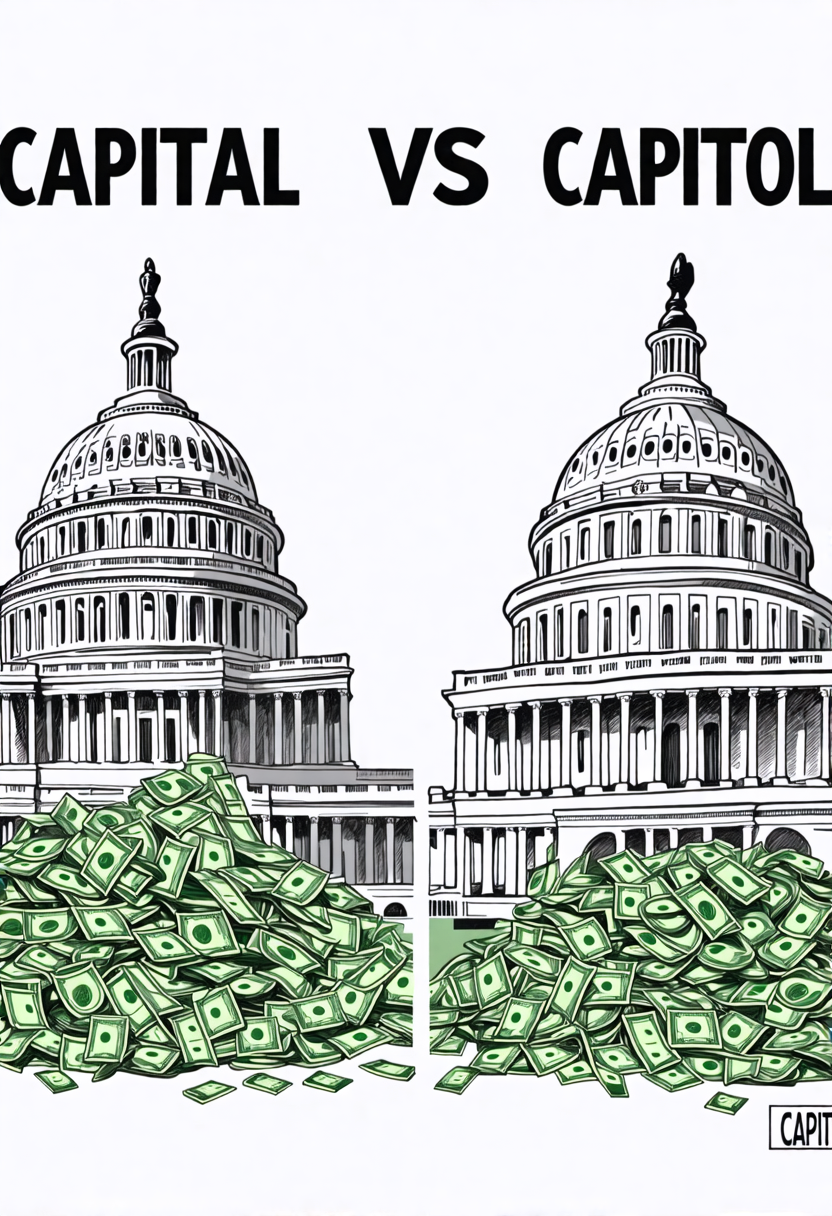Capital Vs. Capitol
The terms ‘capital’ and ‘capitol’ have distinct meanings. ‘Capital’ refers to wealth, such as money or assets, and also denotes the city where a government is based, like Paris is the capital of France. It further includes uppercase letters in writing. Conversely, ‘capitol’ is specifically the building where a legislature meets, such as the U.S. Capitol in Washington, D.C.
Definition of Capital
Capital has various meanings, each contextually distinct. In the domain of typography, it refers to uppercase letters used at the beginning of sentences or proper nouns. For example, ‘Paris’ begins with a capital letter.
Capital also denotes accumulated wealth or assets essential for generating more wealth. Businesses often seek to increase their capital to expand operations.
Additionally, capital signifies importance or seriousness, as in ‘The Old Man and the Sea is not Hemingway’s capital work.’
Finally, in geopolitical terms, it refers to the city that serves as the seat of government for a country, such as Paris being the capital of France.
Definition of Capitol
The term ‘capitol’ specifically refers to a building where a legislative body convenes to create and pass laws. This structure is essential for governmental functions and often symbolizes political authority. Unlike ‘capital,’ which can refer to wealth or importance, ‘capitol’ is strictly used for these legislative buildings. For instance, in the United States, the Capitol in Washington, D.C., houses Congress, where national laws are debated and enacted. Other countries have similar buildings for their own legislative processes.
| Term | Definition |
|---|---|
| Capital | Wealth, uppercase letters, or the seat of government |
| Capitol | A building where a legislative body meets to create and pass laws |
| Example | The U.S. Capitol is where Congress meets to discuss and pass legislation |
Wealth and Capital
While ‘capitol’ refers to legislative buildings, ‘capital’ encompasses various meanings, including wealth.
In the financial context, capital refers to accumulated assets or resources that can be used to generate more wealth. Businesses rely on capital to invest in new projects, expand operations, or improve infrastructure.
For example, freeing up capital can enhance a company’s financial health, as seen with Deutsche Bank. Individuals also seek to grow their capital through investments, savings, or property. This form of capital is essential for economic growth and stability.
Additionally, capital can signify importance or seriousness, as in ‘capital ideas.’

Uppercase Letters
Uppercase letters play an important role in differentiating proper nouns, the beginning of sentences, and emphasizing importance. For example, names of people, places, and specific entities all start with uppercase letters. This helps distinguish them from common nouns.
At the start of sentences, uppercase letters signal the reader that a new statement is beginning. This improves readability and comprehension. Additionally, using uppercase letters can emphasize certain words for added significance. In formal writing, titles of books, articles, and official documents often use uppercase letters for key terms.
Importance and Seriousness
Understanding the use of uppercase letters lays the groundwork for recognizing how capital can denote importance and seriousness. Capital, in various contexts, signifies more than just the initial letter of a sentence. It emphasizes significance and gravity.
Here are some key points to take into account:
- Titles: Capital letters in titles highlight the importance of works or documents.
- Financial Terms: Capital often denotes wealth, underscoring its critical role in economics.
- Legal Documentation: Using capitals in legal texts guarantees clarity and emphasizes key points.
- Formal Writing: Capital letters lend a sense of formality and respect in official correspondence.
Government Seats
In the context of governance, the term ‘capital’ refers to the city that serves as the administrative hub of a country, while ‘capitol’ denotes the specific building where legislative activities occur.
The capital city is typically where the government’s primary offices and officials are located. For example, Washington D.C. is the capital of the United States. In contrast, the capitol is the building where the nation’s legislature, such as Congress, convenes to create and pass laws.
Legislative Buildings
Legislative buildings, such as capitols, are where lawmakers gather to debate and pass laws. These structures serve as the central hub for legislative activities and are essential to the functioning of a democracy. The design and architecture of capitols often symbolize the government’s values and history.
Here are key features of legislative buildings:
- Chambers: Separate rooms for different houses of the legislature.
- Offices: Spaces for legislators and their staff to work.
- Committee Rooms: Areas for detailed discussions and hearings.
- Public Galleries: Sections where citizens can observe proceedings.
Capitol in the U.S
The U.S. Capitol is the iconic building where Congress meets to draft and pass legislation. Located in Washington, D.C., it is a symbol of American democracy. The Capitol houses both the Senate and the House of Representatives.
Its neoclassical architecture features a prominent dome, which is a recognizable landmark. The Capitol not only serves as a legislative center but also as a historic site. It contains important art and artifacts that reflect the nation’s history. The building hosts significant events, including presidential inaugurations and state funerals.
Examples of Capital
Capital frequently refers to financial resources, such as money or assets, used for investment or economic activities. It is essential for the growth and sustainability of businesses and economies. Capital can take various forms, each serving a specific purpose in financial operations.
- Equity Capital: Funds raised by issuing shares in the company.
- Debt Capital: Borrowed funds that need to be repaid with interest.
- Human Capital: The skills, knowledge, and expertise of employees.
- Natural Capital: Natural resources like minerals, water, and forests.
These different forms of capital contribute to the overall wealth and operational capacity of an organization or economy. The efficient management of these resources is vital for achieving long-term success and stability.
Examples of Capitol
While capital represents financial resources, capitol refers to the buildings where legislative bodies meet and pass laws. The most iconic example is the United States Capitol in Washington, D.C., where Congress convenes. In Canada, the Parliament Hill buildings in Ottawa serve as the nation’s legislative hub. Similarly, the Palace of Westminster in London houses the UK Parliament.
Here is a table highlighting these examples:
| Country | Capitol Building |
|---|---|
| United States | United States Capitol |
| Canada | Parliament Hill |
| United Kingdom | Palace of Westminster |







